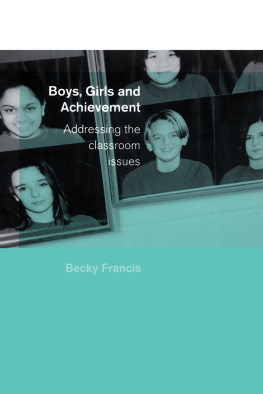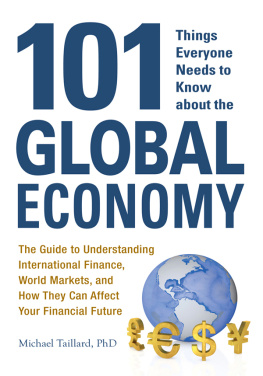Boys, Girls and Achievement
Girls are now outperforming boys at GCSE level, giving rise to a debate in the media on boys underachievement. However, often such work has been a knee-jerk response, led by media, not based on solid research. Boys, Girls and Achievement Addressing the Classroom Issues fills that gap and:
provides a critical overview of the current debate on boys under-achievement;
focuses on interviews with young people and classroom observations to examine how boys and girls see themselves as learners;
shows the impact of gender constructions on pupils learning and behaviour;
analyses the strategies teachers can use to improve the educational achievements of both boys and girls.
Becky Francis provides teachers with a thorough analysis of the various ways in which secondary school pupils construct their gender identities in the classroom. The book also discusses methods by which teachers might challenge these gender constructions in the classroom and thereby address the gender gap in achievement.
Becky Francis is Senior Research Fellow at the School of Post-Compulsory Education, University of Greenwich. Her research interests include gender identity construction in education, gender and achievement, feminist theory and policy developments in nurse education.
First published 2000
by RoutledgeFalmer
Published 2014 by Routledge
2 Park Square, Milton Park, Abingdon, Oxon OX14 4RN
711 Third Avenue, New York, NY 10017, USA
Routledge is an imprint of the Taylor & Francis Group, an informa business
Transferred to Digital Printing 2005
2000 Becky Francis
Typeset in Times New Roman by
Prepress Projects, Perth, Scotland
All rights reserved. No part of this book may be reprinted or reproduced or utilised in any form or by any electronic, mechanical, or other means, now known or hereafter invented, including photocopying and recording, or in any information storage or retrieval system, without permission in writing from the publishers.
British Library Cataloguing in Publication Data
A catalogue record for this book is available
from the British Library
Library of congress Cataloging in Publication Data
Francis, Becky,
Boys, girls and achievement : addressing the classroom issues /Becky Francis,
p. cm.
Includes bibliographical references and index.
1. Sex differences in education. 2. Academic achievement.
LC212.9 F73 2000
306.43dc21 00-024907
CIP
ISBN: 978-0-415-23162-6 (hbk)
ISBN: 978-0-415-23163-3 (pbk)
For Sam
Contents
This book would not have been possible without the co-operation of the staff and pupils in the schools in which I conducted the research. (The names of the students and schools are pseudonyms.) My observation of classes and withdrawal of boys and girls for interview was obviously one more hassle in an already pressurized environment, so I am exceedingly grateful for the friendly tolerance and co-operation of respondents. Warm thanks to them all. Thanks also to the Economic and Social Research Council for their financial support for the project. Some of the data in have also appeared in a paper published in the British Journal of Sociology of Education, and I am grateful for their permission to reproduce it here. Likewise, thanks to Falmer Press for allowing me to produce some of the workshop exercises from Salisbury and Jacksons Challenging Macho Values. Finally, I wish to thank my colleagues at the University of Greenwich and elsewhere, and friends, family and Danny for their on-going support.
Since the mid-1990s an increasing preoccupation with the male role has been reflected in the media and academic press. Extensive social and economic changes and the impact of second-wave feminism in the second half of the twentieth century have led to a change in gender roles in Western society, most easily evidenced in the ever-increasing numbers of women now engaging in paid work (even after marriage). Yet, despite these changes, gender continues to influence our behaviour, choices and life outcomes. The types of work performed by men and women often remain distinct. Women continue to earn less than men on average, are more likely to work part-time and are dramatically under-represented in the most powerful jobs. The continuing assumption that male values and lifestyles represent the norm is illustrated in examples such as the lack of childcare provision in the British workplace. Further, gender roles in the family apparently remain largely unchanged, since women continue to perform the lions share of housework and childcare (often in addition to their paid work).
But despite this apparent continuity in some areas of gender relations, an anxiety about the male role is increasingly being expressed. In the mass media the talk has been of a crisis of masculinity, the theory being that the traditional male breadwinner role has been eroded by restructuring in the workplace and the increasing numbers of women participating in paid work. Hence men are left apparently bemused as to their purpose. Some sections of the media have used this account to explain male crime and increasing suicide rates. This focus on masculinity has been reflected in the academic press, with increasing numbers of researchers exploring the issue of masculine identity in various environments. And, crucially, in Britain this concern about the crisis of masculinity has coincided with the increased awareness that boys have shown a relative lack of improvement at GCSE level compared with girls. GCSEs are the exams that pupils in England and Wales take in their final year of compulsory schooling. The publication of league tables, introduced in the 1990s to show the GCSE results of each school, has meant that gendered patterns in achievement at this level have become more visible. Hence the concern with masculinity has found its particular expression in the field of education in a debate on boys underachievement.
Such debates raise many questions. For example, are boys really underachieving? Media reports sometimes suggest that boys constitute a problem (e.g. The Problem With Boys, Observer, 1999). Is this the case? What has led to the improvement in girls GCSE results? How can any underachievement be combated? And teachers and educationalists may raise the further question why does classroom interaction remain so gendered?
This book attempts to address these questions. It does so by drawing on findings from a research project investigating gender constructions in the secondary school classroom, and on feminist and educational theory. The book describes the findings of a study that aimed to examine the gender constructions of 14- to 16-year-old pupils, with particular reference to the changing gender pattern in GCSE exam performance. Hence the study sought to explore how symbolic gender cultures, constructed and taken up in the classroom by girls and boys to delineate their gender identities, affected the pupils classroom interaction and their approaches to education. Further, it attempted to examine the effect of these gender constructions on pupils post-16 educational and career choices.
Having evaluated the evidence provided by this and other research, suggestions are made for future approaches and classroom practice in relation to gender and achievement. Regarding girls outperformance of boys, the teachers immediate concerns have usually been for practical suggestions and strategies to combat the boys comparative underachievement. However, it is very important to identify and understand the causes of underachievement before suggesting solutions, and this is something that many works in the area have failed to do. There is much confusion and contradiction in the literature. For example, some argue that the crisis of masculinity is lowering the confidence of boys so that they no longer have the motivation or confidence to achieve, whereas others maintain that it is boys very complacency and over-self-confidence that is causing the problems. Some of these hypotheses are based on sketchy or non-existent research. Conversely, many more theoretical works fail to engage with the lived reality of the classroom. This book attempts to take a fresh approach, seeking to combine theory and practice.
Next page






